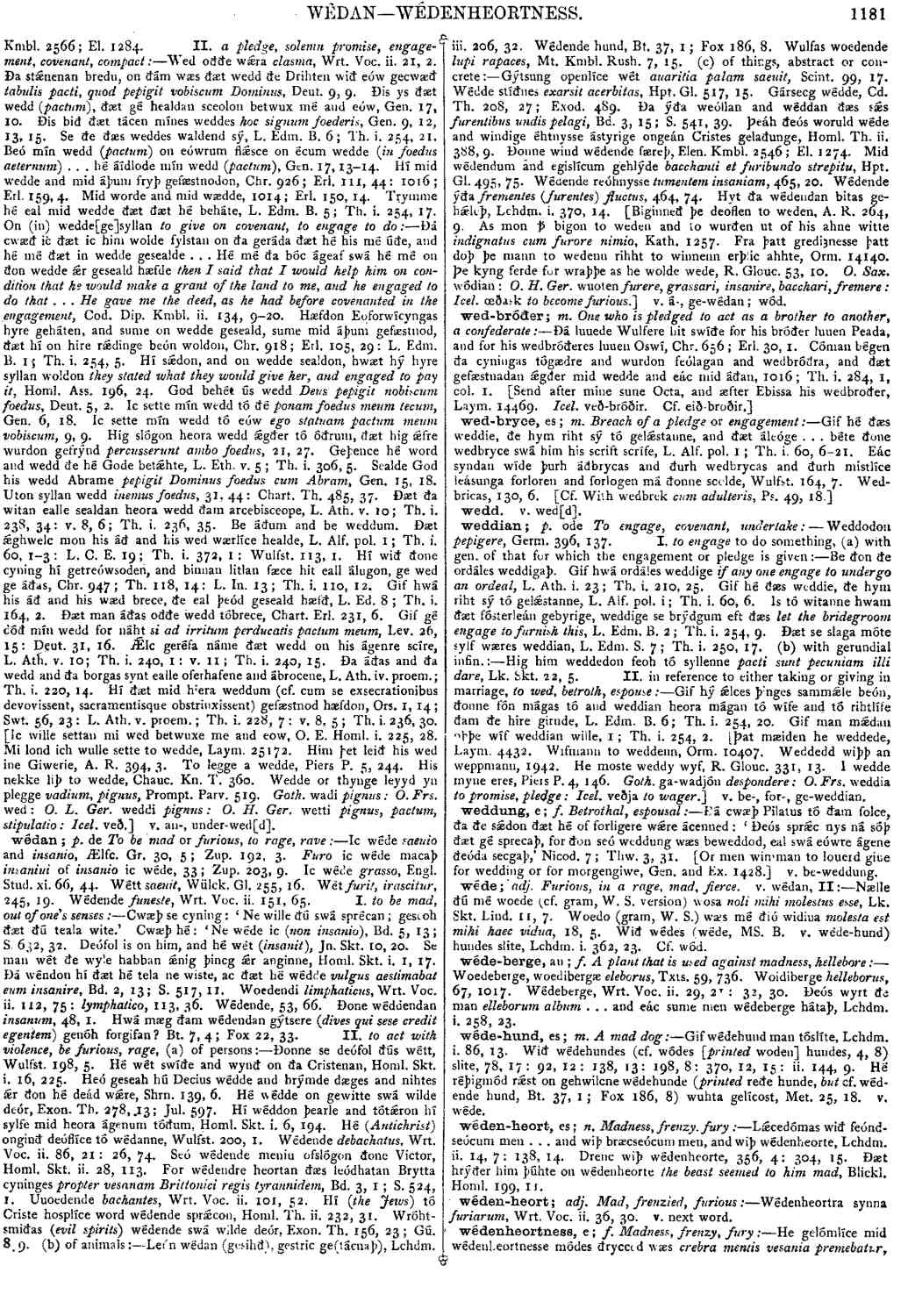wédan
- verb [ weak ]
-
Ic wéde
saeuio and insanio, Ælfc. Gr. 30, 5; Zup. 192, 3. Furo ic wéde macaþ insaniui of insanio
ic wéde, 33 ;- Zup. 203, 9.
-
Ic wéde
grasso.
- Engl. Stud. xi. 66, 44.
-
Welt
saeuit, Wülck. Gl. 255, 16. Wét furit, irascitur,
- 245, 19.
-
Wédende
funeste,
- Wrt. Voc. ii. 151, 65.
-
Ðonne se deófol ðús wétt,
- Wulfst. 198, 5.
-
Hé wét swíðe and wynð on ða Cristenan,
- Homl. Skt. i. 16, 225.
-
Heó geseah hú Decius wédde and brýmde
de
dæges and nihtes ǽr ðon hé deád wǽre,- Shrn. 139, 6.
-
Hé wédde on gewitte swá wilde deór,
- Exon. Th. 278, 13; Jul. 597.
-
Hí wéddon þearle and tðtǽron hí sylfe mid heora ágenum tóðum,
- Homl. Skt. i. 6, 194.
-
Hé (
Antichrist
) onginð deóflíce tó wédanne,- Wulfst. 200, 1.
-
Wédende
debachatus.
- Wrt. Voc. ii. 86, 21 : 26, 74.
-
Seó wédende men iu ofslógon ðone Victor,
- Homl. Skt. ii. 28, 113.
-
For wédendre heortan ðæs leódhatan Brytta cyninges propter vesanam Brittonici regis tyrannidem, Bd. 3, 1; S. 524, Uuoedende
bachantes,
- Wrt. Voc. ii. 101, 52.
-
Hí (
the Jews
) tó Criste hosplíce word wédende sprǽcon,- Homl. Th. ii. 232, 31.
-
Wróht*-*smiðas
(evil spirits)
wédende swá wilde deór,- Exon. Th. 156, 23; Gú. 8, 9.
-
wédan (gesihð), gestric ge(tácnaþ),
- Lchdm. iii. 206, 32.
-
Wédende hund,
- Bt. 37, 1; Fox 186, 8.
-
Wulfas woedende
lupi rapaces,
- Mt. Kmbl. Rush. 7, 15.
-
Gýtsung openlíce wét
auaritia palam saenit,
- Scint. 99, 17.
-
Wédde stíðnes
exarsit acerbitas,
- Hpt. Gl. 517, 15.
-
Gársecg wédde,
- Cd. Th. 208, 27; Exod. 489.
-
Ða ýða weóllan and wéddan ðæs sǽs
furentibus undis pelagi,
- Bd. 3, 15; S. 541, 39.
-
Þeán ðeós woruld wéde and windige éhtnysse ástyrige ongeán Cristes gelaðunge,
- Homl. Th. ii. 388, 9.
-
Ðonne wind wédende færeþ,
- Elen. Kmbl. 2546; El. 1274.
-
Mid wédendum and egislícum gehlýde
bacchanti et furibundo strepitu,
- Hpt. Gl. 495, 75.
-
Wédende reóhnysse
tumentem insaniam,
- 465, 20.
-
Wédende ýða
frementes (furentes) fluctus,
- 464, 74.
-
Hyt ða wédendan bitas ge*-*hǽlcþ,
- Lchdm. i. 370, 14.
Bosworth, Joseph. “wédan.” In An Anglo-Saxon Dictionary Online, edited by Thomas Northcote Toller, Christ Sean, and Ondřej Tichy. Prague: Faculty of Arts, Charles University, 2014. https://bosworthtoller.com/34927.
Checked: 0